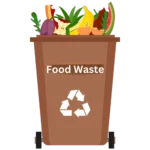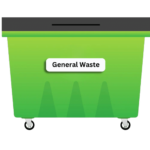Hotel Waste Collection
Request hospitality waste quotes today and save thousands.
Just enter your hotel’s postcode…
Request hospitality waste quotes today and save thousands.
Just enter your hotel’s postcode…
Start saving now

of annual UK food waste is created by the hospitality industry

Hotels produce an astonishing 289,700 tonnes of waste per year

The hospitality industry produces 2.87 million tonnes of plastic each year
Navigating the complexities of waste collection and disposal in the hotel industry requires a strategic and comprehensive approach.
We highlight the essential practices for efficient hotel waste management. Discover the key to seamlessly integrating these ideas into your hotel’s daily operations, ensuring environmental compliance, sustainable practices, and strategic waste management.
We cover the following subjects in detail:
Managing the diverse range of waste generated daily is a critical task. From the leftovers in dining areas to the obsolete electronics behind the scenes, each type of waste presents unique challenges and opportunities for sustainable practices.
We delve into the specific waste streams produced in hotels:

Food waste in hotels encompasses leftovers and unused ingredients from cafes, guest rooms, and restaurants. This includes perishable items that expire before use, surplus food inventory purchases, preparation scraps from the kitchen and uneaten food from guests’ plates.

General waste in hotels encompasses non-recyclable rubbish generated across various functions, including room cleaning, kitchen activities, and disposing of worn-out items like sheets.

The hotel recycling stream targets the segregation and collection of recyclable materials such as paper, plastic shampoo bottles, shower caps and other commonly recycled items.

Hazardous waste in hotels primarily involves waste from cleaning processes, including chemicals and materials that pose risks to health and the environment if improperly handled. This category requires special attention to ensure safe disposal and compliance with regulations to prevent contamination and safeguard guests and staff’s well-being.

The electronic waste stream in hotels includes outdated or broken electronics such as TVs, wiring, and reception and back-office computer equipment. This type of waste requires specialised disposal methods to recycle valuable materials and properly handle toxic components.

Glass bottles collected from guest rooms represent a substantial portion of waste that can be fully recycled. By segregating glass bottles and waste, you can benefit from lower disposal costs and avoid paying landfill tax associated with general waste.
Our experts summarise the three most common waste collection services that will benefit your hotel’s waste management:

Commercial waste collection services efficiently dispose of general business waste, ensuring operations remain clean and compliant with environmental regulations. They are designed to meet the specific needs of each business, offering regular pickups and tailored solutions to manage waste effectively.

This service streamlines separating and recycling paper, plastics, and tin and aluminium cans from hotels, simplifying the recycling process. It not only aids businesses in reducing their environmental footprint but also ensures materials are repurposed.

This service is tailored to manage the high volume of glass waste generated, from guest room beverage containers to dining and event services. It ensures that all glass is collected separately, maximising recycling efficiency.
The hospitality industry’s commitment to sustainability is centred on the critical endeavour of waste minimisation.
Our experts summarise best practice strategies for hotels that reduce their environmental footprint and enhance operational efficiency.

Launching a comprehensive recycling program involves strategically placing well-marked bins throughout the hotel, including in guest rooms, lobbies, and dining areas, to facilitate the segregated recycling of paper, glass, plastics, and metals.
This initiative streamlines waste management and underscores the hotel’s commitment to environmental stewardship, engaging guests and staff in sustainable practices.

By monitoring food consumption patterns, hotels can significantly reduce overordering and waste, aligning purchase orders more closely with actual needs.
Implementing a composting program for organic waste, alongside donating surplus food to local charities, improves sustainability efforts. This strategy minimises waste and supports community welfare, ensuring that hotels can contribute positively to the environment and society.

Adopting a sustainable procurement policy involves selecting products from recycled materials and choosing suppliers committed to taking back packaging for reuse or recycling.
This approach reduces waste and supports a circular economy, demonstrating the hotel’s dedication to environmental sustainability through mindful purchasing decisions.

Donating gently used items (in good condition), such as linens, furniture, and electronics, to local charities or organisations is a sustainable practice that prevents useful items from being discarded.

Implementing recycling bins in hotel rooms is a strategic approach to encourage guests to participate in waste separation at the source.
This straightforward yet effective method facilitates recycling and fosters a culture of environmental responsibility among guests. A single bin with two separate compartments, one for recycling and the other for general waste, will contribute massively.
Efficient waste management is crucial for hotels to maintain cleanliness, comply with regulations, and demonstrate environmental responsibility.
The strategic placement and selection of commercial bins are vital in achieving these goals.
Our experts explore this further;

Placement: Found in guest rooms, lobbies, and back office areas.
Common materials: Non-recyclable packaging, wrappers, used napkins, and any waste that doesn’t fit into recyclable or specialised categories.
Reason: To collect the bulk of waste generated by guests and staff that cannot be easily recycled, minimising litter and maintaining cleanliness.

Placement: Located in guest rooms, conference areas, dining facilities, and staff areas.
Common materials: Paper, cardboard, plastics, cans, and glass bottles.
Reason: To encourage separating recyclable materials from general waste, reduce landfill use, and support the hotel’s sustainability efforts.

Placement: Primarily in kitchens and dining areas.
Common materials: Leftover food scraps, expired ingredients, and kitchen prep waste.
Reason: To separate organic waste for composting or bioenergy production, reduce general waste volumes, and contribute to the hotel’s sustainability goals.

Placement: Bars, dining areas, and sometimes in event spaces.
Common materials: Beer and wine bottles and jars.
Reason: Segregating away from DMR reduces cross-contamination to maximise recycling

Placement: Typically found in the maintenance areas or outside waste storage for hotels.
Common materials: Used batteries, old electronics like mobile phones, and small appliances.
Reason: To safely dispose of or recycle electronic waste, prevent toxic substances from contaminating landfills, and recover valuable materials.

Placement: Back-of-house areas, accessible only to trained staff.
Common materials: Cleaning chemicals, fluorescent bulbs, and any materials classified as hazardous.
Reason: Special containers are needed to safely store hazardous waste until it can be properly disposed of, ensuring compliance with health and safety regulations and preventing environmental contamination.
Premier Inn (part of the Whitbread Group) is a British hotel chain and the UK’s largest hotel brand, with over 800 hotels and 72,000 rooms lays out its sustainability strategies.
Whitbread’s strategy to minimise food waste and its overall sustainability plans, detailed in its Environmental, Social, and Governance (ESG) Report, showcases a comprehensive approach to sustainability within its operations.
Key initiatives include:
Whitbread’s sustainability initiatives, as detailed in their ESG report, illustrate their mulit dimensional approach to environmental responsibility.
The WRAP report on The Business Case for Reducing Food Loss and Waste: Hotels provides compelling evidence that reducing food waste in hotels is environmentally responsible and financially beneficial.
💡 Analysing data from 42 hotel sites across 15 countries, the study reveals that hotels, on average, saw a seven times financial return for every pound invested in food waste reduction.
Key findings include that over 70% of sites recouped their investment within the first year, and 95% had done so by the second year.
The study also underscores no significant correlation between a site’s market segment or geography and its benefit-cost ratios, suggesting that these findings are broadly applicable to the hotel industry
It emphasises the importance of setting ambitious targets for food waste reduction, measuring progress, and taking action based on those measurements.
This aligns with the broader goal of achieving a 50% reduction in food waste by 2030, which is in line with Target 12.3 of the Sustainable Development Goals.
Hotels can handle food waste efficiently by implementing a strategy at every stage of the food lifecycle, from procurement to disposal.
Here are several key approaches:
Our waste experts answer common questions surrounding hotel waste management.
Hotels can incorporate waste management into their CSR programs by adopting sustainable waste reduction, recycling, and disposal practices that align with environmental stewardship goals.
Initiatives can include implementing comprehensive recycling programs, reducing food waste through donation and composting, engaging in responsible sourcing that minimises packaging, and investing in energy-efficient and waste-reducing technologies.
These practices contribute to environmental conservation, enhance the hotel’s reputation, and appeal to eco-conscious consumers.
Hotels increasingly prioritise sustainability and efficient resource use, with waste management emerging as a critical component of environmental responsibility.
Several key trends will shape hotel waste management in the future, reflecting a shift towards more sustainable, technology-driven, and community-focused approaches.
Here are some examples of future trends;